Ken MacLeod's Blog, page 14
September 2, 2012
'The Surface of Last Scattering' is to become a film!
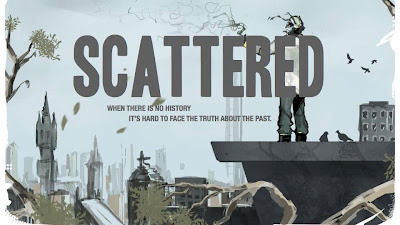
My short story 'The Surface of Last Scattering', published last year in TRSF (a well-received original anthology commissioned by Technology Review) is being made into a short film. Needless to say, I'm over the moon about this. Scattered is the graduation project of MetFilm School students Joshua Bregman (writer-director) and Victoria Naumova (producer), and they've pulled together an impressive team of students and professionals to make the film and act in it. I'm seriously in awe of, and deeply grateful to, the kind of talent that's throwing itself into realising my story on screen.
If you'd like to be a movie mogul - and let's face it, who wouldn't? - go to their fundraising site at IndieGoGo, contribute, and claim whatever amazing perk (which can include, as well as tangible mementoes and desirable treats, your name on the credits) matches your contribution.
Published on September 02, 2012 05:08
August 31, 2012
Dark Eden
 Monday evening's 'Scary Fururistic Fictions' chaired by Stuart Kelly and featuring Chris Beckett and me, was one of the last events at the Edinburgh International Book Festival. It went well, with Stuart steering our discussion in interesting directions, and plenty of good questions coming from the floor. I met Chris for the first time an hour or two before, in the Authors' Yurt (the festival's spacious, imaginative and civilized version of a Green Room) and liked him a lot. We'd received copies of each other's books a fortnight or so earlier, and Chris had already responded to reading mine with a thoughtful and appreciative review. By Monday I was about half-way through my copy of his book Dark Eden (which he kindly signed) but that was already enough for me to be enthusiastic about it and to comment on it in the discussion.
Monday evening's 'Scary Fururistic Fictions' chaired by Stuart Kelly and featuring Chris Beckett and me, was one of the last events at the Edinburgh International Book Festival. It went well, with Stuart steering our discussion in interesting directions, and plenty of good questions coming from the floor. I met Chris for the first time an hour or two before, in the Authors' Yurt (the festival's spacious, imaginative and civilized version of a Green Room) and liked him a lot. We'd received copies of each other's books a fortnight or so earlier, and Chris had already responded to reading mine with a thoughtful and appreciative review. By Monday I was about half-way through my copy of his book Dark Eden (which he kindly signed) but that was already enough for me to be enthusiastic about it and to comment on it in the discussion.I finished reading it a couple of days ago. The main reason it took me about a week to read is that I kept stopping to think. It's one of those books like The Left Hand of Darkness that gets you so convinced by and immersed in its world that you come out of it looking at the real world in a new way. By imagining realistically a planet without a sun, and its ecosystem that runs on geothermal energy, Beckett gives us picture after vivid picture of alien beauty that highlights the different wonder of Earth.
As its title suggests, Dark Eden takes an SF trope so tired nobody uses it any more: what if an isolated man and woman on an alien planet were to become the Adam and Eve of a new world?
Well, for a start, their descendants would have lots of genetic defects ...
The rest of the outcome is likewise logical, and ruthless. The echoes of the Old Testament are there, and deliberate, but the tale also recapitulates the more recent origin myths told by Freud and Engels: the small society we start with is a primeval, promiscuous matriarchal horde, into which the actions of the main character - and reactions to them - begin to introduce patriarchy, and with it the family, private property and the state.
Myth and its meanings are themes of the story, and often darkly funny: one of the legends of the mismatched founding couple re-enacted by their descendants unto the third and fourth generation is called The Big Row. Regular readers of hard SF may feel that the back-story's Earth and its nascent starfaring but troubled society are too crudely sketched - until the late, chilling moment where we glimpse them as they were, and remember through whose eyes we've seen them hitherto.
All that's just the background. The story itself is gripping, full of character, incident and adventure.
Now I find myself in an awkward situation. Like I said, Chris has reviewed my book, and we got on well when we met. If I were to give Dark Eden a rave review, it would look like the sort of mutual authorial back-scratching that Private Eye annually skewers with damning quotes from 'Book of the Year' features. No one would take it seriously.
Fortunately, I don't need to do that, because Dark Eden already has many rave reviews, from an impressively wide range of critics and readers, in the genre and out. Read them, then read the book.
Published on August 31, 2012 01:28
August 21, 2012
Edinburgh International Book Festival notes
Next Monday (27 August, 8:30pm - 9:30pm) I'm doing a Book Festival event, Scary Futuristic Fictions, at Peppers Theatre with Chris Beckett. (Tickets £10.00, £8.00 conc.) I've received (courtesy of the Book Festival) a copy of Chris's latest book, the widely praised Dark Eden, and I can't wait to read it.
Chris is replacing G. Willow Wilson, an author I was greatly looking forward to meeting and who regretfully had to cancel. Her new novel, Alif the Unseen, looks intriguing - a supernatural post-cyberpunk thriller from the storm centre of the Arab revolution. I hope Willow can be a guest at the festival (and/or a British science fiction convention - she has a deep background in comics fandom, comics writing, and political commentary) in the future. Meanwhile, best wishes to her from me and Chris.
In other news, the Genomics Forum again has a team covering the festival for Genotype. Because of work I couldn't commit to being on the reporting team myself, but has that stopped me blogging events for Genotype? No! My latest contribution is on last Saturday's appearance by Jennifer Rohn and Neal Stephenson, and contains enough controversial remarks to incite (I hope) a few comments - if so, over on Genotype, please, not here.
The third and last of Forum's own Book Festival events, The Scientist in Fiction: Creative or Crazed Genius? is on tomorrow Wednesday) at 7 pm.
Chris is replacing G. Willow Wilson, an author I was greatly looking forward to meeting and who regretfully had to cancel. Her new novel, Alif the Unseen, looks intriguing - a supernatural post-cyberpunk thriller from the storm centre of the Arab revolution. I hope Willow can be a guest at the festival (and/or a British science fiction convention - she has a deep background in comics fandom, comics writing, and political commentary) in the future. Meanwhile, best wishes to her from me and Chris.
In other news, the Genomics Forum again has a team covering the festival for Genotype. Because of work I couldn't commit to being on the reporting team myself, but has that stopped me blogging events for Genotype? No! My latest contribution is on last Saturday's appearance by Jennifer Rohn and Neal Stephenson, and contains enough controversial remarks to incite (I hope) a few comments - if so, over on Genotype, please, not here.
The third and last of Forum's own Book Festival events, The Scientist in Fiction: Creative or Crazed Genius? is on tomorrow Wednesday) at 7 pm.
Published on August 21, 2012 03:27
August 14, 2012
I have a new job!
I'm delighted to say that my appointment as Writer in Residence at Edinburgh Napier University has just been officially announced. The university's innovative MA in Creative Writing course, open to full-time and part-time students, is both practical and challenging, with a strong genre component. Over the past few years, I've met and been greatly impressed by its lecturers, course leaders and students, and I very much look forward to working with them.
The 2010-2011 Writer in Residence, Robert Shearman, has some interesting and slightly scary things to say about what the job involves. For more, equally enlightening and entertaining information about the course and its objectives, take a look through the blog - and expect to see some contributions there from me in the coming months.

The 2010-2011 Writer in Residence, Robert Shearman, has some interesting and slightly scary things to say about what the job involves. For more, equally enlightening and entertaining information about the course and its objectives, take a look through the blog - and expect to see some contributions there from me in the coming months.
Published on August 14, 2012 05:54
August 13, 2012
When the Force really is with you
It's not every day you get to shake hands with someone whose name will be remembered on the starships. Today I did, unexpectedly. Participants in the Edinburgh International Book Festival can choose up to ten free tickets. One of mine was for Frank Close on his new book The Infinity Puzzle, about the search for the Higgs Boson. I sat down in the packed-out Scottish Power Theatre tent, and saw on the screen that the event was to be chaired by Peter Higgs.
Chaired! By Peter Higgs!
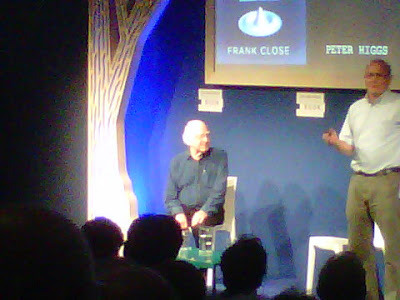
In reality, of course, nothing of the sort took place. The session was introduced by the Festival Director, Nick Barley, who made it very clear how amazing this was. Frank Close outlined the physics, conducted a free-wheeling interview with Professor Higgs, then caught and passed on questions from the audience.
While this was going on I tried to figure out just why the tent was so packed and I was so excited. Like everyone in else in the entire world (obviously) I'd spent the morning of July 4th watching the live feed from the Cern press conference and tweeting madly about it. It was the best Big Science white-knuckle ride until the Curiosity landing last week. But in reality, what I know about physics could be written in biro on the back of my hand, and probably was at some point because I passed the first year physics exam at Glasgow University, albeit on the resit.
I stopped believing physics lectures when they got to electricity. That bit about holes moving where electrons could be but aren't? It might as well have been the poetry of Ezra Pound for all the sense I could make of it. Quantum mechanics? Relativity? I know the Standard Model works and I don't doubt for a moment that it's true to a trillion decimal places and explains, as Close said, 'seven percent of everything' (the rest being dark matter and all that) but there I walk by GPS and not by sight.
And, judging by the questions from the floor, I'm far from alone in this. But we were all thrilled to be there and I think I know why. We were in the presence of a man who has deservedly become the icon of understanding this stuff, and who advanced an idea about something so fundamental to the fabric of reality that we have to recreate conditions just after the Big Bang to test it. And just seeing him, right there in the flesh, gives us a sense of connection to that fundamental force, the Higgs field.
The signing tent was mobbed. All copies of The Infinity Puzzle were gone in seconds, or maybe picoseconds. I picked up a copy of Close's earlier paperback, Neutrino, and joined the queue. I sort of babbled when I asked Professor Higgs to add his signature to the author's.
On top of everything else, the man's a gent.

Chaired! By Peter Higgs!

In reality, of course, nothing of the sort took place. The session was introduced by the Festival Director, Nick Barley, who made it very clear how amazing this was. Frank Close outlined the physics, conducted a free-wheeling interview with Professor Higgs, then caught and passed on questions from the audience.
While this was going on I tried to figure out just why the tent was so packed and I was so excited. Like everyone in else in the entire world (obviously) I'd spent the morning of July 4th watching the live feed from the Cern press conference and tweeting madly about it. It was the best Big Science white-knuckle ride until the Curiosity landing last week. But in reality, what I know about physics could be written in biro on the back of my hand, and probably was at some point because I passed the first year physics exam at Glasgow University, albeit on the resit.
I stopped believing physics lectures when they got to electricity. That bit about holes moving where electrons could be but aren't? It might as well have been the poetry of Ezra Pound for all the sense I could make of it. Quantum mechanics? Relativity? I know the Standard Model works and I don't doubt for a moment that it's true to a trillion decimal places and explains, as Close said, 'seven percent of everything' (the rest being dark matter and all that) but there I walk by GPS and not by sight.
And, judging by the questions from the floor, I'm far from alone in this. But we were all thrilled to be there and I think I know why. We were in the presence of a man who has deservedly become the icon of understanding this stuff, and who advanced an idea about something so fundamental to the fabric of reality that we have to recreate conditions just after the Big Bang to test it. And just seeing him, right there in the flesh, gives us a sense of connection to that fundamental force, the Higgs field.
The signing tent was mobbed. All copies of The Infinity Puzzle were gone in seconds, or maybe picoseconds. I picked up a copy of Close's earlier paperback, Neutrino, and joined the queue. I sort of babbled when I asked Professor Higgs to add his signature to the author's.
On top of everything else, the man's a gent.
Published on August 13, 2012 13:32
August 5, 2012
Landings and crashes
Curiosity landed successfully this morning. In perspective:

Source SPACE.com: All about our solar system, outer space and exploration

Source SPACE.com: All about our solar system, outer space and exploration
Published on August 05, 2012 23:39
Fantastic grow the evening gowns. Agents of the fisc pursue

(Source)
Jo Walton recently wrote about how the future, and particularly the future we can imagine ourselves or our children living into, has darkened or is avoided in current SF. Along the way she linked to an earlier piece, on the dystopian future Earths, over-populated and over-regulated, that backdropped so many of Robert A. Heinlein's novels for young readers. She points out that we don't usually see these futures as dystopias, wonders why not, and asks:
No individual one of these would be particularly noticeable, especially as they’re just background, but sitting here adding them up doesn’t make a pretty picture. What’s with all these dystopias? How is it that we don’t see them that way? Is it really that the message is all about “Earth sucks, better get into space fast”? And if so, is that really a sensible message to be giving young people? Did Heinlein really mean it? And did we really buy into it?Well, I bought into it. It wasn't just Heinlein, and it wasn't just juveniles (as SF for young readers was called before YA, a category that has a whole 'nother passel of problems, as Farah Mendlesohn will tell you). A hefty proportion of the SF I read in my teens had dystopia or disaster as default for the fairly near future, say the first decade or two of the 21st century. It gave me the impression that the world I was going to grow up in was doomed to something like The Fall of Rome.
A bad influence on the young, I'm sure you'll agree, and no preparation for the challenges of real life in a world that is making fitful, unevenly distributed, but nevertheless significant progress.
Today in the Sunday Herald there's an opinion piece by Ian MacWhirter about the ongoing financial crisis, and a column by Trevor Royle, the paper's diplomatic editor, on the ongoing confrontation of the US and Israel with Iran.
MacWhirter suggests that if a Eurozone state (Spain, to pluck an example from the air) defaults or otherwise goes bust, UK (and other) banks might be so exposed that the only way to keep them functioning would be outright nationalization of the financial system, 'this time for keeps'.
Royle's article assumes without evidence that Iran is developing a nuclear weapon - but never mind that, the point is that he discusses the prospect of an attack on Iran by the US or Israel within the next year or so. Russia and China, he says in passing, would not stand idly by. We've heard all this before, of course, and I've sometimes been too quick to take such talk seriously.
What strikes me, however, is how strange normality has become. I don't expect to see, next Sunday, a single letter telling the paper's editors that two of their respected writers have lost the plot. The crisis has become the spectacle. We've all got used to a situation where we don't know, from day to day, if the world we know will be here in the morning. We could wake up and find the ATM doesn't work, and be living by lunch-time in a West gone redder than China. Or we could turn on the weather forecast to find ourselves looking in disbelief at fallout patterns from wrecked nuclear reactors.
There's no question that either of these (or both) would be a bit of a downer. Twitter would be in meltdown, I'll tell you that for nothing, all OMG #banks or Holy Shit #Iran #Russia. What not enough people appreciate, however, is the suffering these possibilities are causing right now. How many, reflecting on how war and crisis have become always-imminent, spare a moment's thought for science fiction writers?
It's all very well for those of us writing all that talking squids in outer space rubbish. What if you're trying to write realistic, socially relevant, near-future SF? I'm working on a novel whose back-story starts, oh, a few years from now, and one of the key points in that back-story is a moment where, as an emergency measure to deal pragmatically with economic collapse, the financial systems of the West get nationalised almost overnight. I came up with that bold idea a year ago. Now I have to consider it possible that something like it might actually happen before I've finished the first draft.
If I could write a novel that centred on that problem, the problem of the radical uncertainty of the near future, I'd be getting somewhere.
Published on August 05, 2012 08:08
July 22, 2012
Not the Master Race
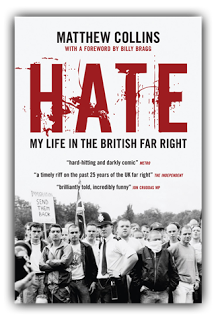
A few days ago I forwarded a promotional tweet about
Matthew Collins' newly revised and reissued memoir Hate: My Life in the British Far Right.
Thanks to the wonders of online marketing, on Friday a free copy of the book landed on my doormat. I finished reading it on Saturday. That's the kind of book it is: hard to put down, very funny, and eye-opening. I've always hated the fash, you understand, but I've sometimes had a dark suspicion that they were a sort of Black Mass satanic inversion of the far left. Happily, I couldn't have been more sadly mistaken. If you've never fully appreciated the significance of German porn ('videos of Animal Farm, and I don't mean the film of George Orwell's book') in the cash-flow and sex-life of British fascism, this book will set you right.
Collins joined the remnants of the National Front as a teenager in the 1980s, at which time the Nazis were in a sorry state, shattered and reduced to a shadow of their late-70s glory by Tories unfairly stealing their votes and Socialists unfairly beating them on the streets. When Collins became sickened and disillusioned he changed sides, became a mole for the anti-fascist magazine Searchlight, and helped to wreck the Front from within.
How the squabbling shower of losers, tossers, creeps, thugs, and drunks that make up the British fascist milieu repaired the damage and rebuilt is outside the main story of this book, but not outside its concern, and the lessons Collins draws are challenging. And his deadpan comic timing is flawless:
The C18 crew [the BNP's defence squad] consisted of all the well-known Nazi football hooligans from London, dressed to the nines in expensive gear, snorting drugs off the tables and drinking bottled beers. This was madness. I followed Nicky into the toilet where he was using his Switch card to cut up some more coke.A cracking read and highly recommended.
Published on July 22, 2012 07:05
July 19, 2012
The Black Train
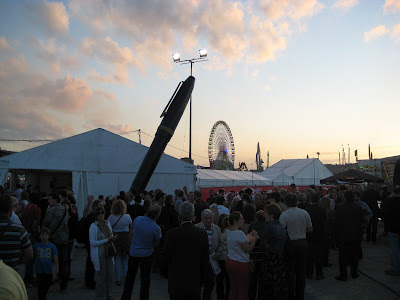
The annual Semana Negra in Gijón, Asturias is a literary festival like no other. For one thing, it has a crowded and raucous funfair attached, complete with Ferris wheel, scary or sedate rides, and air thick with the smells of hot sugar and – this being Spain – abundant, freshly grilled meat. For another, its focus is on genres that some might not regard as literary as all: mainly crime fiction, or 'black novels' as they're called in Spain, with an added peppery dash of comics, westerns, horror, fantasy and science fiction. And finally, it's directly and proudly political.
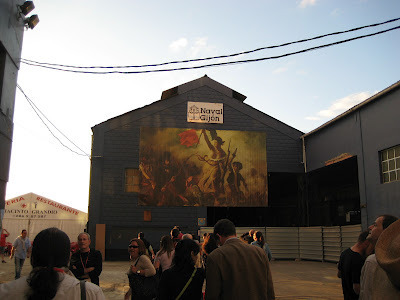
Just how proudly and directly, I found out a couple of weeks ago when we rode from Madrid to Gijón on el Tren Negro - the Black Train. Hired to transport dozens of writers and journalists to the festival, the Black Train is part of Semana Negra's quarter–century of tradition. It has to defer to the time-tabled trains, so progress is full of unscheduled stops and starts. Our one scheduled stop was in Mieres, a coal-mining town in the mountains of Asturias, where we were due to be greeted by the mayor and a delegation of striking miners and taken on procession through the town for a late-afternoon two-hour lunch.
Thousands of miners in the mountains of northern Spain are on strike, against a projected slashing of the subsidies that keep the pits going. The strike is bitter and militant. Passing through one nearly deserted town and village after another, you can see why. It's also popular.
At La Robla in León, the province just south of Asturias, we found ourselves held up for an hour. Journalists piled out on the platform, mobiles to their ears. León miners had blocked the track up ahead, quite unaware that their comrades in the next province – and in a different union – were waiting for us.
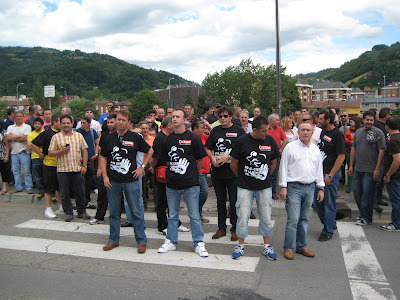
This misunderstanding sorted, we arrived late at Mieres, where Paco Ignacio Taibo II, legendary crime writer and festival director, led a group of writers in solidarity T-shirts out to a tumultuous welcome from the mayor and a dozen likewise T-shirted miners. Songs were sung, to the accompaniment of a bagpiper and a drummer in Asturian costume, who then led writers, mayor and miners through the quiet town. After the mayor had rallied us to a brief sit-down in the main street, we arrived at a courtyard of laden tables. We might have done the lunch justice in two hours. We had twenty minutes and made the most of them. Then it was back on the train and down from the hills to the coast, and Gijón, where a brass band at the station played the Internationale as we climbed on the bus.
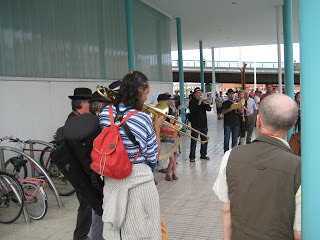
Apart from that - well, like I said, it was a literary festival like no other!
Many thanks to Ian Watson, Cristina Macía, Javi, and the whole magnificent team.
Published on July 19, 2012 14:06
July 3, 2012
The revolution will be audible
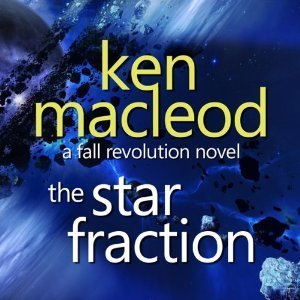 What with one thing and another I'd clean forgotten to mention that all thirteen of my novels are now available on Kindle, and that the first four of these (the Fall Revolution quartet) are also available as unabridged, professionally read audio downloads, at Amazon and at Audible - as is my novella, The Highhway Men.
What with one thing and another I'd clean forgotten to mention that all thirteen of my novels are now available on Kindle, and that the first four of these (the Fall Revolution quartet) are also available as unabridged, professionally read audio downloads, at Amazon and at Audible - as is my novella, The Highhway Men.Naturally, I'd be very interested in hearing (so to speak) what hearers think of the audiobooks. I suspect I'd find them hard to listen to myself, because at some level I already have the voices of the characters - and indeed the narrative voice, which is not necessarily my own even in third-person narration - in my head.
Published on July 03, 2012 13:50
Ken MacLeod's Blog
- Ken MacLeod's profile
- 762 followers
Ken MacLeod isn't a Goodreads Author
(yet),
but they
do have a blog,
so here are some recent posts imported from
their feed.



